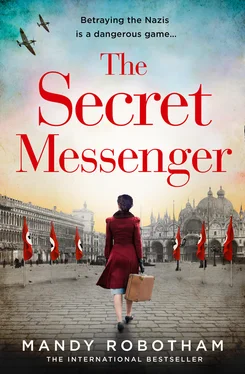1 ...8 9 10 12 13 14 ...17 ‘Like I say, I’m an Italian who loathes pasta,’ he quips back, and follows me inside.
Christmas comes and goes – our first under the awning of occupation – and a cloak of snow covers the city, marking out the waterways and canals of the city as the lifelines that they are. Venice exists under a muffler of white powder, cut by a distinctive chipping of the icy water as the boatmen free their craft each morning. In black and white, the city somehow seems starker, better defined. And yet still so beautiful. As I lie every night under my heap of blankets, a new pair of Mama’s knitted socks over the old, I think of the young partisan men and women up in the mountains near Turin, fighting the elements as much as the Nazi patrols, and my heart goes out to them.
The snow, however, helps the Resistance cause in our city. To an outsider, Venice is a labyrinth at the best of times, with one campo looking much like another, tiny streets and alleyways virtually indistinguishable to those with an untrained eye. Under a carpet of white, it becomes a complex maze – except to those who know its cobbles and pavements off by heart. The Nazi patrols are less visible in the cold; they remain holed up in their barracks or keep warm in several bars that have become their hangouts. For a few weeks at least, I and my fellow Staffettas feel a sense of freedom as we weave our way almost unchallenged.
I have to be careful not to feel a sense of overconfidence at work. Breugal becomes less of a prowler in the office – word has it that his wife has come to soak up the Venetian sights, as if we are still some cosmopolitan centre for the rich and bored. No doubt she will fill her time drinking real and expensive coffee in Florian’s on Piazza San Marco, and later have cocktails in Harry’s Bar, perhaps beside the sign that clearly states: ‘No Jews here’. She might parade alongside the Venetian women of a certain age who try to maintain the city’s grandiose reputation, even though these days the collars of their coats are more likely to be fashioned from rabbit or cat fur than anything exotic.
In the office, then, the atmosphere feels slightly less frenetic, although Signor De Luca continues to ensure that it runs with industrial efficiency. I note he never indulges in idle gossip or lunchtime chatter, and disappears each day at 12.30 precisely, returning exactly thirty-five minutes later. I tend to take my own lunch as he arrives back, since those precious minutes when he’s absent give me time to type frenetically while not under his watchful gaze. My position to the right of him means I can see his face as he leans over whatever document he is reading or correcting. It’s always intense, eyes tracking back and forth, nostrils twitching occasionally – which strangely reminds me of Popsa reading his daily paper. Sometimes, Cristian takes off his glasses, pinches his nose with his long fingers and draws the paper nearer to his face. If he’s suddenly distracted, he peers upwards without replacing his glasses and squints into the distance, adding to the look of a bibliophile. He’s something of an enigma to the other office girls, who find it hard to ally his appearance with the strict work rate he demands, occasionally raising his voice to quell any chatter if it threatens to slow the steady production of reports.
‘Bloody fascist,’ Marta, one of the other typists, mutters if Cristian takes her to task, although it’s under her breath and masked by the thunder of typewriter keys. Breugal appears to rely on him entirely – not least because his own Italian is so poor and Cristian’s German crisp and fluent – and calls him into the inner office a dozen times a day with a smart ‘De Luca!’ though I note it’s rarely with an irritated bark. For all their innate cruelty, their bulldozing of nations and countries, we in the Resistance realise the secret of Nazi success is that they know how to use people – via a combination of flattery, stealth or the simple and stark threat of death. With Cristian, Breugal is definitely on the charm offensive.
I have perhaps more to do with Cristian than some of the other typists, because of my role as a translator. He sometimes walks over to query a word or a phrase, and if it’s especially puzzling we both stand over the huge dictionary and work out the phrasing. He always smells nice, of soap and what I seem to recall is Italian cologne. Who can afford, or even access, cologne in wartime? Those that have good Nazi connections, I suppose. But still, he perplexes me. He doesn’t fit – a square peg in a round hole – and yet he appears snug within the Nazi hierarchy. I resolve to be wary; Cristian De Luca is meticulous and observant. He could easily be equally as dangerous as the general controlling our occupied city.
4 Chapter 4: Discovery Chapter 5: A New Task Chapter 6: Two Sides of the Coin Chapter 7: New Interest Chapter 8: Finding and Frustration Chapter 9: Drinks with the Enemy Chapter 10: A New Role Chapter 11: Casting Out Chapter 12: Opening Up Chapter 13: Story Time Chapter 14: A Voice from the Lagoon Chapter 15: Love and Fury Chapter 16: A Lull Chapter 17: On Hold Chapter 18: Small Talk Chapter 19: A Detour Chapter 20: Arrival Chapter 21: The City Cauldron Chapter 22: The Seeker Chapter 23: A Fiery Reaction Chapter 24: Across the Lagoon Chapter 25: A New Hope Chapter 26: Revenge Chapter 27: The Bloody Summer Chapter 28: Seeking and Waiting Chapter 29: Sorrow Chapter 30: A Low Ebb of the Tide Chapter 31: Playing Detective Chapter 32: A Parting Chapter 33: In Hiding Chapter 34: The Search for Coffee Chapter 35: Red-Handed Chapter 36: Taking Flight Chapter 37: Age and Enlightenment Chapter 38: After Chapter 39: Completion Chapter 40: The Typewriter Acknowledgements Keep Reading … About the Author By the Same Author About the Publisher
Discovery Chapter 4: Discovery Chapter 5: A New Task Chapter 6: Two Sides of the Coin Chapter 7: New Interest Chapter 8: Finding and Frustration Chapter 9: Drinks with the Enemy Chapter 10: A New Role Chapter 11: Casting Out Chapter 12: Opening Up Chapter 13: Story Time Chapter 14: A Voice from the Lagoon Chapter 15: Love and Fury Chapter 16: A Lull Chapter 17: On Hold Chapter 18: Small Talk Chapter 19: A Detour Chapter 20: Arrival Chapter 21: The City Cauldron Chapter 22: The Seeker Chapter 23: A Fiery Reaction Chapter 24: Across the Lagoon Chapter 25: A New Hope Chapter 26: Revenge Chapter 27: The Bloody Summer Chapter 28: Seeking and Waiting Chapter 29: Sorrow Chapter 30: A Low Ebb of the Tide Chapter 31: Playing Detective Chapter 32: A Parting Chapter 33: In Hiding Chapter 34: The Search for Coffee Chapter 35: Red-Handed Chapter 36: Taking Flight Chapter 37: Age and Enlightenment Chapter 38: After Chapter 39: Completion Chapter 40: The Typewriter Acknowledgements Keep Reading … About the Author By the Same Author About the Publisher
Bristol, July 2017
Back home in Bristol, Luisa flicks through more scraps of aged paper, the fibrous edges disintegrating a little more each time she unfolds the fragile notes. Some of the ink has begun to fade and she needs to hold the paper up to the lamp to make out the scrawl. Some are just letters, numbers or nonsensical phrases – and they are largely in Italian, with the occasional message in phonetical English. ‘My beard is blond,’ one says, with what is presumably the Italian equivalent below. The sometimes bizarre nature of the messages only makes her delve deeper and wonder more. She buys a cheap Italian-English dictionary and pores over the words to try to make some kind of sense of them. In the month since Luisa discovered the attic box, its content has become like the richest compost for her imagination. She finds herself racing through real, paid work, forcing herself to concentrate on its suddenly inane message, when all she wants to do is get back to her large box of intrigue.
Читать дальше












